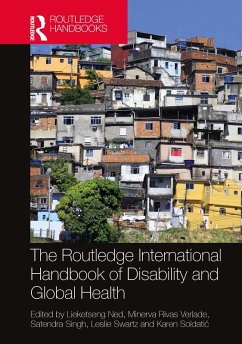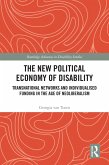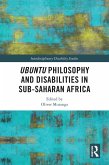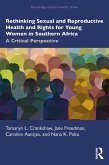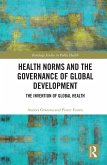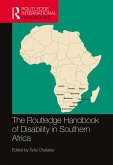The Routledge International Handbook of Disability and Global Health (eBook, PDF)
Redaktion: Ned, Lieketseng; Soldatic, Karen; Swartz, Leslie; Singh, Satendra; Rivas Velarde, Minerva
46,95 €
46,95 €
inkl. MwSt.
Sofort per Download lieferbar

23 °P sammeln
46,95 €
Als Download kaufen

46,95 €
inkl. MwSt.
Sofort per Download lieferbar

23 °P sammeln
Jetzt verschenken
Alle Infos zum eBook verschenken
46,95 €
inkl. MwSt.
Sofort per Download lieferbar
Alle Infos zum eBook verschenken

23 °P sammeln
The Routledge International Handbook of Disability and Global Health (eBook, PDF)
Redaktion: Ned, Lieketseng; Soldatic, Karen; Swartz, Leslie; Singh, Satendra; Rivas Velarde, Minerva
- Format: PDF
- Merkliste
- Auf die Merkliste
- Bewerten Bewerten
- Teilen
- Produkt teilen
- Produkterinnerung
- Produkterinnerung

Bitte loggen Sie sich zunächst in Ihr Kundenkonto ein oder registrieren Sie sich bei
bücher.de, um das eBook-Abo tolino select nutzen zu können.
Hier können Sie sich einloggen
Hier können Sie sich einloggen
Sie sind bereits eingeloggt. Klicken Sie auf 2. tolino select Abo, um fortzufahren.

Bitte loggen Sie sich zunächst in Ihr Kundenkonto ein oder registrieren Sie sich bei bücher.de, um das eBook-Abo tolino select nutzen zu können.
This handbook will raise awareness about the importance of health and well-being of people with disabilities in the context of the global development agenda: Leaving No-one Behind.
- Geräte: PC
- mit Kopierschutz
- eBook Hilfe
Andere Kunden interessierten sich auch für
![The Routledge International Handbook of Disability and Global Health (eBook, ePUB) The Routledge International Handbook of Disability and Global Health (eBook, ePUB)]() The Routledge International Handbook of Disability and Global Health (eBook, ePUB)46,95 €
The Routledge International Handbook of Disability and Global Health (eBook, ePUB)46,95 €![The Routledge Handbook of Postcolonial Disability Studies (eBook, PDF) The Routledge Handbook of Postcolonial Disability Studies (eBook, PDF)]() The Routledge Handbook of Postcolonial Disability Studies (eBook, PDF)46,95 €
The Routledge Handbook of Postcolonial Disability Studies (eBook, PDF)46,95 €![The New Political Economy of Disability (eBook, PDF) The New Political Economy of Disability (eBook, PDF)]() Georgia van ToornThe New Political Economy of Disability (eBook, PDF)40,95 €
Georgia van ToornThe New Political Economy of Disability (eBook, PDF)40,95 €![Ubuntu Philosophy and Disabilities in Sub-Saharan Africa (eBook, PDF) Ubuntu Philosophy and Disabilities in Sub-Saharan Africa (eBook, PDF)]() Ubuntu Philosophy and Disabilities in Sub-Saharan Africa (eBook, PDF)42,95 €
Ubuntu Philosophy and Disabilities in Sub-Saharan Africa (eBook, PDF)42,95 €![Rethinking Sexual and Reproductive Health and Rights for Young Women in Southern Africa (eBook, PDF) Rethinking Sexual and Reproductive Health and Rights for Young Women in Southern Africa (eBook, PDF)]() Tamaryn CrankshawRethinking Sexual and Reproductive Health and Rights for Young Women in Southern Africa (eBook, PDF)38,95 €
Tamaryn CrankshawRethinking Sexual and Reproductive Health and Rights for Young Women in Southern Africa (eBook, PDF)38,95 €![Health Norms and the Governance of Global Development (eBook, PDF) Health Norms and the Governance of Global Development (eBook, PDF)]() Anders GranmoHealth Norms and the Governance of Global Development (eBook, PDF)43,95 €
Anders GranmoHealth Norms and the Governance of Global Development (eBook, PDF)43,95 €![The Routledge Handbook of Disability in Southern Africa (eBook, PDF) The Routledge Handbook of Disability in Southern Africa (eBook, PDF)]() The Routledge Handbook of Disability in Southern Africa (eBook, PDF)45,95 €
The Routledge Handbook of Disability in Southern Africa (eBook, PDF)45,95 €-
-
-
This handbook will raise awareness about the importance of health and well-being of people with disabilities in the context of the global development agenda: Leaving No-one Behind.
Dieser Download kann aus rechtlichen Gründen nur mit Rechnungsadresse in A, B, BG, CY, CZ, D, DK, EW, E, FIN, F, GR, HR, H, IRL, I, LT, L, LR, M, NL, PL, P, R, S, SLO, SK ausgeliefert werden.
Produktdetails
- Produktdetails
- Verlag: Taylor & Francis eBooks
- Seitenzahl: 762
- Erscheinungstermin: 31. Mai 2024
- Englisch
- ISBN-13: 9781003859345
- Artikelnr.: 70327502
- Verlag: Taylor & Francis eBooks
- Seitenzahl: 762
- Erscheinungstermin: 31. Mai 2024
- Englisch
- ISBN-13: 9781003859345
- Artikelnr.: 70327502
- Herstellerkennzeichnung Die Herstellerinformationen sind derzeit nicht verfügbar.
Lieketseng Ned is an occupational therapist and an Associate Professor in the Division of Disability and Rehabilitation Studies in the Department of Global Health at Stellenbosch University. She is also an Editor-in-Chief of the African Journal of Disability. Minerva Rivas Verlade is an Associate Professor in Disability Health at the Geneva School of Health Science. Satendra Singh MD is a Professor of Physiology at the University College of Medical Sciences, University of Delhi, India. Leslie Swartz is a clinical psychologist and Professor in Psychology at Stellenbosch University, South Africa. Karen Soldati¿ is a Canadian Excellence Research Chair - Health Equity and Community Wellbeing, Toronto Metropolitan University and Institute Fellow, Whitlam Institute, Western Sydney University.
Section One - Disability and Health Frameworks. 1."Nothing About Us Without Us!": Disability representation in healthcare structures, policies, and relationships. 2.Discussing models of disability and models of health in a global context. 3.Epistemologies of disability from the global South: Towards good health. 4.The radical potential of psychosocial disability activism in the global South. 5.Inclusive and Equitable Policies: EquiFrame and EquIPP as Frameworks for the Analysis of the Inclusiveness of Policy Content and Processes. 6.Redressing access to equitable health care for people with disabilities: Using a health systems framework. Section Two - Health Justice, Rights and Bioethics. 7.Lack of accessibility and the Right to Health: Reframing access as a manifestation of epistemic justice. 8.Disability, Mental Health and International Human Rights Law: A Global Health Perspective. 9.Decision-making for or against predictive genetic/genomic testing for late-onset diseases in prenatal and pediatric setting. 10.Health care reforms and policies from a disability-rights perspective. 11.Disability competencies for disability rights in the curriculum in the Global North and Global South. Section Three - Gendering Disability Health. 12.Disability and reproductive health: Global experiences. 13.Traumatic Brain Injury as a Result of Violence for Indigenous Women: The Importance of Appropriate Monitoring Systems, Screening and Models of Care. 14.The influence of marital relationships on the mental health of mothers of children with autism in Bangladesh. 15.Indigenous Healing Cosmologies and Western Systems in Madwaleni: A Proposed space for a Reconciliation Model for Plural Healthcare. Section Four - Disability and Global Mental Health. 16.Global Mental Health and Disability in Sub-Saharan Africa. 17.Culture, disability and global mental health: Perspectives from an African worldview. 18.Stigma and Discrimination against People with Psychosocial Disabilities in Low- And Middle-Income Countries. 19.Integrating persons with psychosocial disabilities across sectors: meaningful and authentic inclusion in global mental health. 20.Mapping "Global mental health": Histories, practices, and research. 21.Health Humanities and Psychosocial Disabilities in a Campus-town: An Autoethnographic Case Study. 22.The Vexed Question of Capacity as Enshrined by the UNCRPD: Psychosocial disability, and human rights. Section Five - Disability and Access to Healthcare, Including Workforce Development. 23.Much more than 'getting there': Frontline views of healthcare engagement with people with disabilities. 24.Access to healthcare services by people with intellectual and developmental disabilities. 25.Disability Studies and Critical Pedagogy in Health Professional Education: Developing a community-focused inclusive workforce using lessons from South Africa. 26.Practical ways of doing health promotion with special focus on people with disabilities. 27."Unfortunately we are stuck": Considerations for improving access and inclusion to health for people who are deaf. 28.Promoting Inclusive Development in a Rural Community. 29.Knocking on Access Doors: Learners with Disabilities in Health Professions. 30.Disability Accommodations: Towards Equity and Justice. 31.Sign language and other minority languages in healthcare: Reframing language as a tool for accessing health care. Section Six - Crises and Health. 32.Catastrophic Health-Care Expenditures for People with Disabilities: A barrier to health care. 33.Disability, Food Insecurity, and Health: Examining Linkages in the Yemini Civil War. 34.Nurturing Children with Disabilities in Crisis. 35.Shared stories of uncertainty, fear and discrimination: How narrative interviews about COVID-19 with people with disabilities in 5 countries exemplify exacerbation of existing liminality and structural violence. Section Seven - Technology and Digital Health. 36.The worlds of disability and health technologies: A vital part of the larger inclusion environment. 37.Prerequisites for digital participation - The case of digital health technology and people with impairments. 38.Market Forces in Automated Mental Health Services: New Claims in Algorithmic Care and Disability Justice. 39.Barriers for adoption and innovation on rehabilitation technology in LMIC countries: A case study in Colombia. 40.Virtual reality as a panacea to promote the health of people with neurodevelopmental disabilities? Current evidence, challenges, and the way forward. 41.Algorithmic bias and access of patients with a disability to healthcare in the digital health age: Legal perspectives from Switzerland, the European Union, and the United States of America. Section Eight - Disability, Ageing and Dementia Care. 42.Dementia, disability, and global health. 43.Moving toward inclusive dementia care for an ethnically diverse population in Belgium. 44. Ageing, disability, dementia and gender and sexuality diversity: What do the intersections tell us about models of care? 45.Disability and Dementia Care in Ghana: A political economy review. 46.The Double Bind: Ageing and the Transition of Care for People with Disability and Their Carers from Minority Migrant Communities.
Section One - Disability and Health Frameworks. 1."Nothing About Us Without Us!": Disability representation in healthcare structures, policies, and relationships. 2.Discussing models of disability and models of health in a global context. 3.Epistemologies of disability from the global South: Towards good health. 4.The radical potential of psychosocial disability activism in the global South. 5.Inclusive and Equitable Policies: EquiFrame and EquIPP as Frameworks for the Analysis of the Inclusiveness of Policy Content and Processes. 6.Redressing access to equitable health care for people with disabilities: Using a health systems framework. Section Two - Health Justice, Rights and Bioethics. 7.Lack of accessibility and the Right to Health: Reframing access as a manifestation of epistemic justice. 8.Disability, Mental Health and International Human Rights Law: A Global Health Perspective. 9.Decision-making for or against predictive genetic/genomic testing for late-onset diseases in prenatal and pediatric setting. 10.Health care reforms and policies from a disability-rights perspective. 11.Disability competencies for disability rights in the curriculum in the Global North and Global South. Section Three - Gendering Disability Health. 12.Disability and reproductive health: Global experiences. 13.Traumatic Brain Injury as a Result of Violence for Indigenous Women: The Importance of Appropriate Monitoring Systems, Screening and Models of Care. 14.The influence of marital relationships on the mental health of mothers of children with autism in Bangladesh. 15.Indigenous Healing Cosmologies and Western Systems in Madwaleni: A Proposed space for a Reconciliation Model for Plural Healthcare. Section Four - Disability and Global Mental Health. 16.Global Mental Health and Disability in Sub-Saharan Africa. 17.Culture, disability and global mental health: Perspectives from an African worldview. 18.Stigma and Discrimination against People with Psychosocial Disabilities in Low- And Middle-Income Countries. 19.Integrating persons with psychosocial disabilities across sectors: meaningful and authentic inclusion in global mental health. 20.Mapping "Global mental health": Histories, practices, and research. 21.Health Humanities and Psychosocial Disabilities in a Campus-town: An Autoethnographic Case Study. 22.The Vexed Question of Capacity as Enshrined by the UNCRPD: Psychosocial disability, and human rights. Section Five - Disability and Access to Healthcare, Including Workforce Development. 23.Much more than 'getting there': Frontline views of healthcare engagement with people with disabilities. 24.Access to healthcare services by people with intellectual and developmental disabilities. 25.Disability Studies and Critical Pedagogy in Health Professional Education: Developing a community-focused inclusive workforce using lessons from South Africa. 26.Practical ways of doing health promotion with special focus on people with disabilities. 27."Unfortunately we are stuck": Considerations for improving access and inclusion to health for people who are deaf. 28.Promoting Inclusive Development in a Rural Community. 29.Knocking on Access Doors: Learners with Disabilities in Health Professions. 30.Disability Accommodations: Towards Equity and Justice. 31.Sign language and other minority languages in healthcare: Reframing language as a tool for accessing health care. Section Six - Crises and Health. 32.Catastrophic Health-Care Expenditures for People with Disabilities: A barrier to health care. 33.Disability, Food Insecurity, and Health: Examining Linkages in the Yemini Civil War. 34.Nurturing Children with Disabilities in Crisis. 35.Shared stories of uncertainty, fear and discrimination: How narrative interviews about COVID-19 with people with disabilities in 5 countries exemplify exacerbation of existing liminality and structural violence. Section Seven - Technology and Digital Health. 36.The worlds of disability and health technologies: A vital part of the larger inclusion environment. 37.Prerequisites for digital participation - The case of digital health technology and people with impairments. 38.Market Forces in Automated Mental Health Services: New Claims in Algorithmic Care and Disability Justice. 39.Barriers for adoption and innovation on rehabilitation technology in LMIC countries: A case study in Colombia. 40.Virtual reality as a panacea to promote the health of people with neurodevelopmental disabilities? Current evidence, challenges, and the way forward. 41.Algorithmic bias and access of patients with a disability to healthcare in the digital health age: Legal perspectives from Switzerland, the European Union, and the United States of America. Section Eight - Disability, Ageing and Dementia Care. 42.Dementia, disability, and global health. 43.Moving toward inclusive dementia care for an ethnically diverse population in Belgium. 44. Ageing, disability, dementia and gender and sexuality diversity: What do the intersections tell us about models of care? 45.Disability and Dementia Care in Ghana: A political economy review. 46.The Double Bind: Ageing and the Transition of Care for People with Disability and Their Carers from Minority Migrant Communities.
